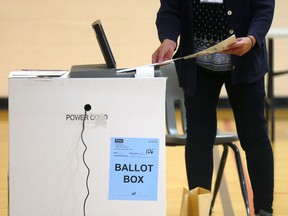It’s become apparent that it’s an issue the premier is using to placate her base and solidify a positive result in her upcoming leadership review

During a conversation on tax collection at last week’s Alberta Municipalities annual general meeting, Premier Danielle Smith touched on her decision to abandon the idea of Alberta collecting its own income taxes.
Despite many in her party still supporting the idea — even Smith has spoken favourably about it — it was concluded that such a change would cost the province at least $1 billion, and so the status quo (the Canada Revenue Agency collecting and remitting taxes) remains.
That was a sensible decision. Whatever fantasies some might harbour about confiscating federal tax dollars, the reality is that a separate provincial tax form and tax collection agency would impose significant costs and offer no benefit. Why would we want governments implementing policy that was all con and no pro?
Unfortunately, despite the plea from an overwhelming number of Alberta municipalities, the province is holding firm to a separate decision that comes with a clear financial downside but no apparent upside.
A resolution at the AGM calling on the province to reconsider the ban passed with more than 85 per cent support. Despite the wide margin, the premier wasn’t budging.
But why? There have been no issues with the machines and they are a cost-effective way of quickly and efficiently counting ballots. We still fill out ballots with pencil and paper, so a paper trail still exists when it needs to be relied upon. Much of this seems imported from the U.S. and the ridiculous conspiracy theories around voting machines in the 2020 presidential election.
Smith simply noted that they have “heard that people want to go back to paper ballots,” and pointed to the delayed results in last year’s provincial election as evidence that these tabulators are not all they’re cracked up to be.
Never mind the obvious cost discrepancies, but the issue in last year’s election, as Elections Alberta explained, was the new process for the “vote anywhere” option. Even though tabulators counted the ballots, the results all had to be manually verified and entered into the system.
This is hardly an argument for banning the tabulators and it wasn’t even something that was cited by Municipal Affairs Minister Ric McIver in his initial defence of the ban. McIver also made vague references to unspecified numbers of Albertans who support the move. He also implied the ban would “give confidence to Albertans” and “bolster their trust” in local elections.
One could just as easily argue that leaving the count up to individuals who might have their own sinister intent or sloppy habits could erode confidence or trust. But none of this speculation results from any sort of meaningful consultation, let alone a review of the evidence. Pandering to those who conjure up worst-case scenarios or entertain bizarre conspiracy theories is not a responsible way to make such decisions.
There have been no reported issues with these tabulators. There will be costs resulting from banning them. As far as the facts are concerned, it’s all downside and no upside.
At the very least, the province should compensate municipalities for these extra costs.
But, of course, there is only one taxpayer. The preferable option would be to leave things as they were.
Afternoons with Rob Breakenridge airs weekdays from 12:30 to 3 p.m. on QR Calgary Radio